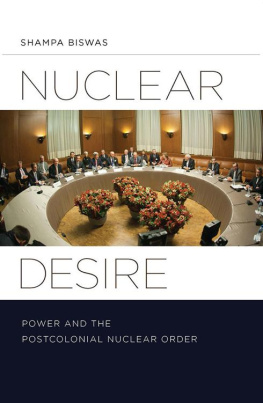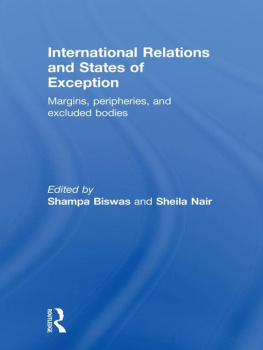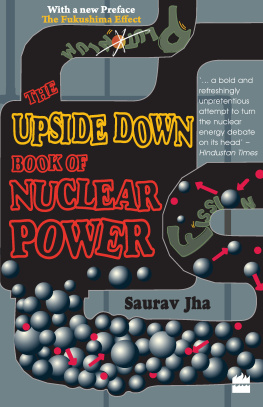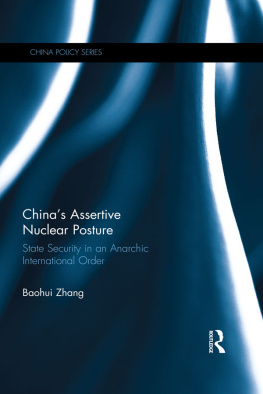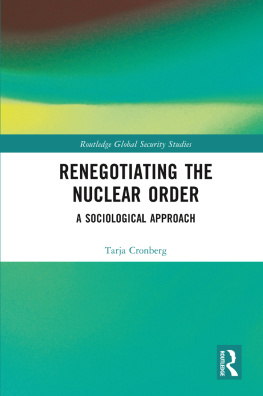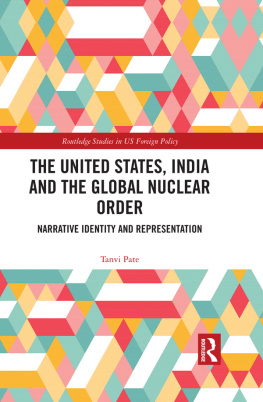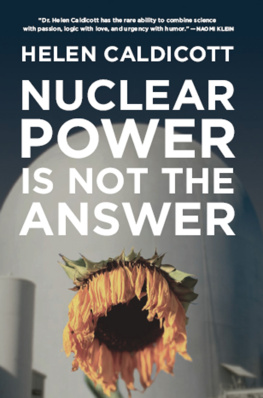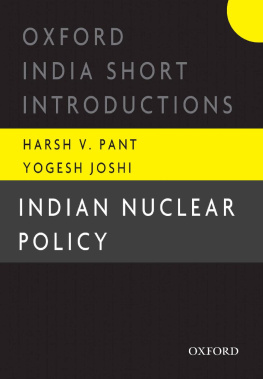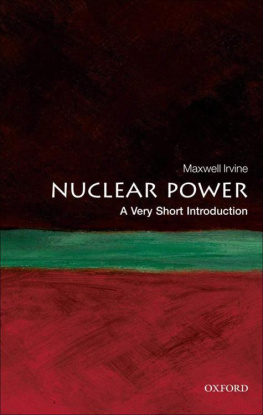Shampa Biswas - Nuclear Desire: Power and the Postcolonial Nuclear Order
Here you can read online Shampa Biswas - Nuclear Desire: Power and the Postcolonial Nuclear Order full text of the book (entire story) in english for free. Download pdf and epub, get meaning, cover and reviews about this ebook. year: 2014, publisher: University of Minnesota Press, genre: Politics. Description of the work, (preface) as well as reviews are available. Best literature library LitArk.com created for fans of good reading and offers a wide selection of genres:
Romance novel
Science fiction
Adventure
Detective
Science
History
Home and family
Prose
Art
Politics
Computer
Non-fiction
Religion
Business
Children
Humor
Choose a favorite category and find really read worthwhile books. Enjoy immersion in the world of imagination, feel the emotions of the characters or learn something new for yourself, make an fascinating discovery.
- Book:Nuclear Desire: Power and the Postcolonial Nuclear Order
- Author:
- Publisher:University of Minnesota Press
- Genre:
- Year:2014
- Rating:3 / 5
- Favourites:Add to favourites
- Your mark:
- 60
- 1
- 2
- 3
- 4
- 5
Nuclear Desire: Power and the Postcolonial Nuclear Order: summary, description and annotation
We offer to read an annotation, description, summary or preface (depends on what the author of the book "Nuclear Desire: Power and the Postcolonial Nuclear Order" wrote himself). If you haven't found the necessary information about the book — write in the comments, we will try to find it.
Nuclear Desire: Power and the Postcolonial Nuclear Order — read online for free the complete book (whole text) full work
Below is the text of the book, divided by pages. System saving the place of the last page read, allows you to conveniently read the book "Nuclear Desire: Power and the Postcolonial Nuclear Order" online for free, without having to search again every time where you left off. Put a bookmark, and you can go to the page where you finished reading at any time.
Font size:
Interval:
Bookmark:
Nuclear Desire
Nuclear Desire
Power and the Postcolonial Nuclear Order
Shampa Biswas

University of Minnesota Press
Minneapolis | London
Copyright 2014 by the Regents of the University of Minnesota
All rights reserved. No part of this publication may be reproduced, stored in a retrieval system, or transmitted, in any form or by any means, electronic, mechanical, photocopying, recording, or otherwise, without the prior written permission of the publisher.
Published by the University of Minnesota Press
111 Third Avenue South, Suite 290
Minneapolis, MN 55401-2520
http://www.upress.umn.edu
Library of Congress Cataloging-in-Publication Data
Biswas, Shampa.
Nuclear desire : power and the postcolonial nuclear order / Shampa Biswas.
Includes bibliographical references and index.
ISBN 978-1-4529-4342-8
1. Nuclear nonproliferationPolitical aspectsHistory. 2. Nuclear arms controlHistory. 3. Postcolonialism. I. Title.
JZ 5675. B 57 2014
327.1'747dc23
2014005524
The University of Minnesota is an equal-opportunity educator and employer.
To Sumita Biswas and Richard Ashford, for keeping me intact
To build peace, now more than ever, it is necessary to build more than peace. To refuse nuclear weapons, we must refuse much more than nuclear weapons.
Raymond Williams, The Politics of Nuclear Disarmament
Contents
I am pleased to have this opportunity to express my gratitude to some of the mentors, friends, and comrades who have shaped my intellectual formation and helped sustain my intellectual pursuits. Conditions of work are integral to all our labors. This is even more true for women and minority scholars in an increasingly neoliberal academy. In that context, the Department of Politics at Whitman College is a remarkable place to live and work. But one of the joys of working in this liberal arts college has been the vast network of colleagues from a variety of different disciplines who have enhanced my intellectual life in so many ways. I owe a special thanks to Tim Kaufman-Osborn for his generous mentorship over the years. Phil Brick, Paul Apostolidis, Susanne Beechey, Aaron Bobrow-Strain, Melisa Casumbal-Salazar, Kristy King, Leena Knight, Tom Knight, Gaurav Majumdar, Dalia Rokhsana, Nicole Simek, and Zahi Zalloua have enriched my professional and personal lives in so many ways. Elyse Semerdjian and Jon Walters have been wonderfully enlivening intellectual allies. Jeanne Morefield inspired and guided me in more ways than I can enumerate. Finally, the friendship, intellectual camaraderie, and support of Bruce Magnusson have been vital to my work. I have also had the good fortune of working with some of the brightest and edgiest students who sharpened my thinking and clarified my political commitments in ways that I could not have anticipated. There are too many of them to list here, but so many have gone on to make all manners of change in the world. Here I must thank Mitch Dunn, Marten King, and Sara Rasmussen for all their help with research and writing, and I must especially thank Thomas Friedenbach, without whose early help with research I could not have conceived or executed this project.
Outside Whitman, I have been sustained by a wide circle of friends and colleagues who have both carved out a space for the kind of work I am inspired to do and engaged with my work in many different ways. Bud Duvall and Naeem Inayatullah first taught me to trust my intellectual instincts and speak with honesty and clarity. Anna Agathangelou, Tarak Barkawi, Marshall Beier, David Blaney, Geeta Chowdhry, Carol Cohn, Lisa Disch, Siba Grovogui, Sankaran Krishna, Sheila Nair, Himadeep Muppidi, Eric Selbin, and Latha Varadarajan are all formidable scholars who have pushed, challenged, and helped form my thinking in ways that I can no longer even trace. I am deeply grateful to Marshall Beier for his sharp and attentive reading of the manuscript in its entirety.
My parents, Nirmal and Sumita Biswas, taught me all I know about love, integrity, and perseverance. Of the many gifts that she has given me, my mother was the first to give me my love of reading, writing, and politics. Amit, Swati, Nikhiel, and Neil have been among my fiercest and most generous cheerleaders. Elaine Ashford and Janet Axell have showed me great wisdom and given me much support.
I thank my editor, Pieter Martin, for his unflagging support and expert guidance.
I have learned so much about pacifism and justice from the intelligence, kindness, and many generosities of my sons, Ishan and Samir. I think they endured my many absences because they genuinely believed that my work may contribute in some measure to making a more peaceful and just world. Although my own ambitions are much more modest in this regard, for their sake I hope that they are right. Finally, there is nothing I can say that will adequately express the depth of my gratitude to my partner in all things, Richard Ashford. Without his constant encouragement, willingness to listen and engage with my work, and endless forms of daily nourishment, I could not have begun or finished this project. With him, so much more is possible.
ABM Anti-Ballistic Missile (Treaty)
ACDA Arms Control and Disarmament Agency
ACDIS Arms Control, Disarmament, and International Security
AEC Atomic Energy Commission
ANA Alliance for Nuclear Accountability
BAS Bulletin of the Atomic Scientists
BESA BeginSadat Center for Strategic Studies
CACNP Center for Arms Control and Non-Proliferation
CDI Center for Defense Information
CEA Commissarait a LEnergie Atomique
CISAC Center for International Security and Cooperation
CITS Center for International Trade and Security
CNS Center for Nonproliferation Studies
CRDF (U.S.) Civilian and Research Development Foundation
CRS Congressional Research Service
CSI Container Security Initiative
CSIS Center for Strategic and International Studies
CSP Center for Security Policy
CTBT Comprehensive (Nuclear) Test Ban Treaty
CTBTO Comprehensive Test Ban Treaty Organization
CTR (NunnLugar) Cooperative Threat Reduction
DAE Department of Atomic Energy
DPG Delhi Policy Group
DTRA Defense Threat Reduction Agency
ENDC Eighteen Nation Committee on Disarmament
EURATOM European Atomic Energy Community
FAS Federation of American Scientists
FMCT Fissile Material Cutoff Treaty
G8 Group of Eight
GDP gross domestic product
GICNT Global Initiative to Combat Nuclear Terrorism
GNEP Global Nuclear Energy Partnership
HDI Human Development Index
HEU highly enriched uranium
IAEA International Atomic Energy Association
ICBM intercontinental ballistic missile
ICNND International Commission on Nuclear Non-Proliferation and Disarmament
IGCC Institute on Global Conflict and Cooperation
IISS International Institute for Strategic Studies
INESAP International Network of Engineers and Scientists Against Proliferation
INF Intermediate-Range Nuclear Forces (Treaty)
INMM Institute of Nuclear Materials Management
IPCS Institute of Peace and Conflict Studies
IPPNW International Physicians for the Prevention of Nuclear War
IR international relations (the discipline)
IRBM intermediate-range ballistic missile
ISIS Institute for Science and International Security
ISTC International Science and Technology Center
L&T Larsen and Toubro
LAWS Lawyers Alliance for World Security
LTBT Limited Test Ban Treaty
MAD mutually assured destruction
METI Ministry of Economy, Trade, and Industry
Next pageFont size:
Interval:
Bookmark:
Similar books «Nuclear Desire: Power and the Postcolonial Nuclear Order»
Look at similar books to Nuclear Desire: Power and the Postcolonial Nuclear Order. We have selected literature similar in name and meaning in the hope of providing readers with more options to find new, interesting, not yet read works.
Discussion, reviews of the book Nuclear Desire: Power and the Postcolonial Nuclear Order and just readers' own opinions. Leave your comments, write what you think about the work, its meaning or the main characters. Specify what exactly you liked and what you didn't like, and why you think so.

